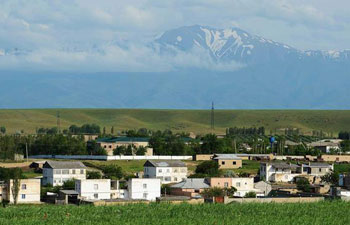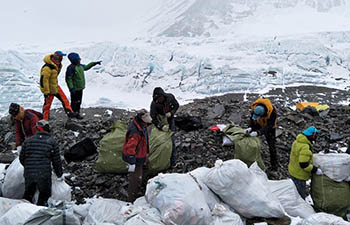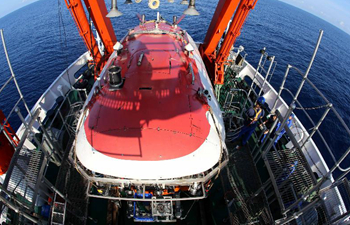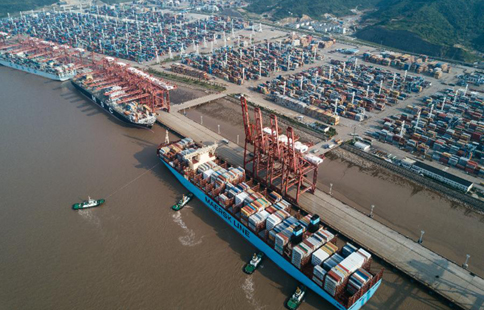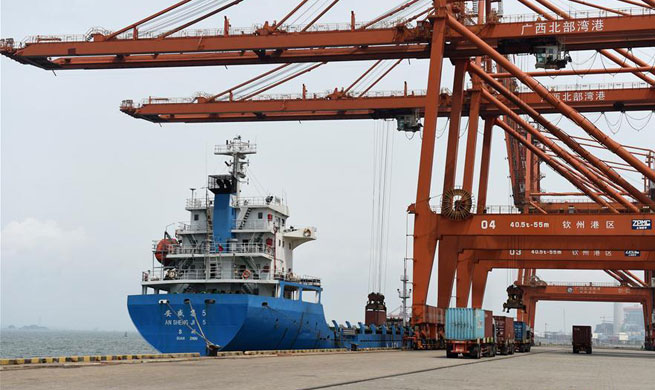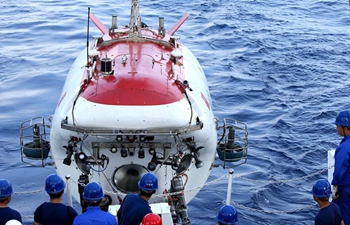ISTANBUL, May 10 (Xinhua) -- The establishment of de-escalation zones in war-torn Syria is a positive first step to end the conflict, but also risks paving the way for the country's eventual disintegration by crystallizing the borders between various armed groups, analysts said.
"Lines of de-escalation would serve to sharpen the divide between the areas controlled by (armed) groups," Cahit Armagan Dilek, director of the 21st Century Turkey Institute think tank, told Xinhua.
Four de-escalation or safe zones were established in Syria last week under an agreement brokered by Russia, Turkey and Iran in peace talks in Astana, Kazakhstan.
"This situation would first set the stage for an autonomous, federal structure in Syria, and then for the country's disintegration when the time is ripe," remarked Dilek.
For Turkey, a breakup of its southern neighbor may further boost Kurdish separatism at home, as Ankara is facing a three-decade-odd insurgency by the Kurdistan Workers' Party (PKK).
The four safe havens created in western Syria, where various rebel groups were fighting the Syrian army, went into effect over the past weekend.
The deal covers the province of Idlib, a part of Aleppo near Idlib, the Ghouta suburbs of Damascus, the northern part of Homs province and some areas in southern Syria.
Huseyin Bagci, a professor of international relations with the Middle East Technical University (METU) in Ankara, feels the deal could also set the ground for Kurdish autonomy in Syria.
"A no-fly zone may in the future be declared for the Kurdish-controlled areas in northern Syria, as was the case for the Iraqi Kurds in the 1990s," he told Xinhua.
Following the Iraqi occupation of Kuwait in 1990, the U.S.-led coalition did not allow the Iraqi military to advance against Kurdish rebels in the north by declaring a no-fly zone north of the 36th parallel.
The Kurdish militia forces in Syria, known as the People's Protection Units (YPG), have carved out three autonomous cantons along the Turkish border during the civil war.
Turkey is concerned about the emergence of an autonomous Kurdish region in its southern neighbor that may later evolve into a state ruled by the YPG, seen by Ankara as simply a Syrian offshoot of the PKK.
One week before his first face-to-face meeting with his Turkish counterpart Recep Tayyip Erdogan, U.S. President Donald Trump approved on Monday a plan to arm Syrian Kurds as part of Washington's ongoing efforts to drive the Islamic State from its stronghold of Raqqa.
Despite repeated opposition from Ankara, Washington has been arming the YPG with sophisticated weapons and providing protection for its cantons against a possible Turkish strike.
The United States sees the YPG as a reliable ground force in the fight against the Islamic State in Syria, and hundreds of U.S. special forces have long been training the Kurdish fighters.
A Turkish air strike against YPG and PKK positions at the end of last month drew relatively strong U.S. criticism, and in its wake U.S. armored vehicles and troops were seen patrolling parts of the YPG-controlled areas on the Turkish border.
The new de-escalation deal would not work without no-fly zones, but the introduction of such zones could ban Turkish jets from flying over Syria as well, Murat Bilhan, deputy chairman of the Istanbul-based Turkish Asian Center for Strategic Studies, told Xinhua.
The main objective of the Russia-proposed de-escalation zones is to reinforce Damascus' hold over the areas under its control in western part of the country, observed Dilek, a former staff officer in the Turkish military.
By joining the effort, Turkey may be hoping for the establishment of a Sunni safe zone around Idlib, a city quite close to the Turkish border where about 45,000 radical Islamist rebels and their families were taken from Aleppo in December as part of a cease-fire deal brokered by Russia and Turkey.
The Jabhat Fateh al-Sham, formerly known as al-Nusra Front, is the dominant rebel group in Idlib.
President Erdogan said last week that the de-escalation zones would help settle half the problems in Syria. The Turkish government offered until last summer extensive support to rebel groups fighting to topple Syrian President Bashar al-Assad.
Under the de-escalation pact, security zones to be established along the de-escalation zones will include check points and observation posts to prevent any armed confrontation and ensure proper humanitarian aid supply.
The memorandum on which the three guarantors agreed also states that "the functioning of the checkpoints and observation posts as well as the administration of the security zones shall be ensured by the forces of the guarantors by consensus."
Turkey's Sabah daily reported on Monday, based on anonymous military sources, that Turkish troops would intervene in Idlib if needed.
According to the report, Turkish troops would step in if the Jabhat Fateh al-Sham would not hand over the city to the Free Syrian Army (FSA) fighters and lay down arms.
The FSA is the rebel group currently supported by Turkey in the Syrian civil war.
Syrian Foreign Minister Walid al-Moallem stated on the same day that there would be no international forces involved in enforcing the cease-fire in the safe havens.
Moallem was referring to Turkish troops when he spoke of international forces, according to METU's Bagci.
The Syrian government sees Turkish military presence on its soil as occupation and a violation of the international law.
Backed by the FSA, the Turkish army captured in a previous operation several towns in northern Syria. The operation was aimed at fighting the Islamic State as well as stopping the two Kurdish cantons in northeastern Syria from uniting with the one in Afrin.
Following a U.S. missile strike on a Syrian air base early last month, Turkey has once again started calling for the removal of the Syrian government.
The analysts are concerned that any military involvement in Idlib may spell trouble for Turkey.
Military operations to be conducted against the al-Qaida-affiliated groups in Idlib may make Turkey a target for terrorists, warned Dilek.
Turkey should not enter into an open conflict with any group in Idlib for the benefit of its own national interests, cautioned Bilhan, a former diplomat.
Turkey is hosting around three million refugees from Syria, fearful that a worsening war there would spark another exodus to the country.
Yasar Yakis, a former Turkish foreign minister, feels the most concrete effect of the de-escalation deal for Turkey is "the steps Turkey will be taking to adjust its Syria policy to the realities in the field."
Noting Turkey will now assume the difficult task of observing that rebels such as Jabhat Fateh al-Sham abide by the deal, he told Xinhua, "Turkey's involvement will make a substantive contribution to the easing of tension in the field in Syria."
Like many analysts in Turkey, Yakis has been critical of the Turkish government's stance on the Syrian civil war.
"Trying to overthrow the regime of a neighbouring country was the first example of negative attitude in Turkey's history for centuries since the Ottoman times," he said.
In the opinion of the analysts, the move to create safe havens would bring a cease-fire and stability to Syria for at least a certain period.
They drew attention as well to many unclear grey areas that need to be worked out in the agreement, voicing scepticism that it is difficult to make the deal work particularly without the U.S. involvement.
"If the (de-escalation) process succeeds, that is a right step toward peace, but it also has many risks," said Bilhan, a former ambassador, who also noted that some rebel groups are not happy about Iran's being one of the guarantors of the deal.
Details of the maps about the four safe havens will not be ready before June, according to press reports.
The Trump administration, which has on several occasions talked about establishing safe zones in Syria, has so far offered a vague support for the safe haven deal and apparently has some misgivings about it.
U.S. Defense Secretary Jim Mattis said early this week that Washington would look at the proposal to see if it could work.
If the U.S. stands behind the deal, the initiative may slowly move forward, observed Yakis.




